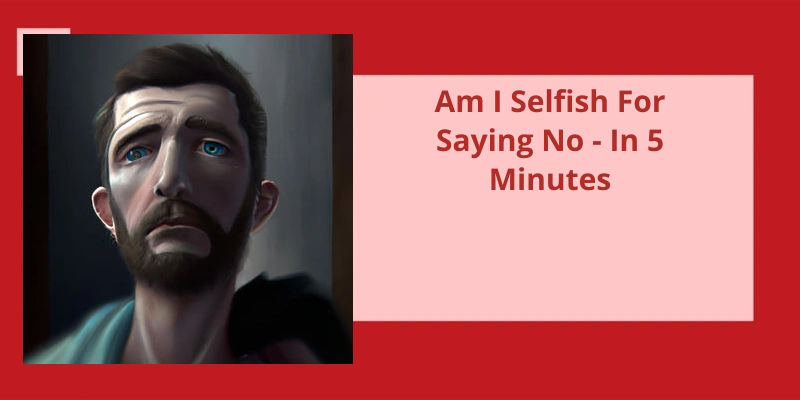In today's fast-paced and demanding world, finding the right balance between personal boundaries and pleasing others can be quite challenging. Many times, we find ourselves torn between the desire to be helpful and the need to prioritize our own well-being. The question of whether saying "no" to someone makes us selfish is a common dilemma that often plagues our minds. In this article, titled "Am I Selfish for Saying No – In 5 Minutes, I'll Give You the Truth," we will explore the intricacies of setting boundaries, evaluate the reasons behind feeling selfish, and ultimately shed light on the truth behind the act of saying "no." By the end of this read, you’ll gain valuable insights into this eternal struggle, empowering you to make choices that align with your happiness and self-care.
Why Is Saying No Not Selfish?
Saying no to someone or declining a request doesn’t automatically make you selfish. In fact, it’s quite the opposite. Being unselfish means caring about the interests and well-being of others as much as your own. It’s about balancing your personal needs with your responsibilities towards others. By saying no, you’re simply prioritizing your own needs and boundaries.
It’s important to remember that you’ve the right to choose where you invest your time, energy, and resources. Not every request or person deserves your attention, and it’s okay to say no when you feel stretched or overwhelmed. By setting boundaries and saying no when necessary, you’re safeguarding your mental and emotional well-being. This allows you to have the capacity to better help and support others when you can.
One of the misconceptions about saying no is the fear of being perceived as selfish or uncaring. However, it’s essential to understand that you can’t please everyone all the time. Trying to accommodate every request or always saying yes can lead to burnout and neglecting your own needs. Saying no is an act of self-respect and self-preservation. It’s about valuing your time and energy and recognizing your limitations.
Choosing which people or problems to prioritize isn’t a reflection of your selfishness, but rather a way to allocate your resources effectively. Understanding your own boundaries and limits is crucial for maintaining a healthy balance in your life. Saying no to certain requests allows you to fully commit to the things that truly matter to you and make a positive difference in your life and the lives of those around you.
It means acknowledging your own needs and priorities, and making choices that are in alignment with them. Remember, it’s not about always pleasing everyone, but rather finding a balance that allows you to lead a fulfilling and meaningful life.
Conclusion
In the world filled with various obligations, requests, and demands, it’s natural to wonder if setting boundaries and saying no to certain things makes us selfish. Sometimes, saying no is necessary for our own well-being, mental health, and personal growth. It allows us to prioritize our own needs and goals, establish healthy boundaries, and maintain balance in our lives. By understanding that saying no isn’t a moral judgment, but rather an act of self-care, we can navigate our lives with greater authenticity and compassion. It’s crucial to recognize that we aren’t obligated to please everyone or meet every request, as long as we communicate our decisions respectfully and honestly. So, next time you find yourself contemplating saying no, remember that taking care of yourself isn’t selfish, but rather an act of self-love and preservation.






